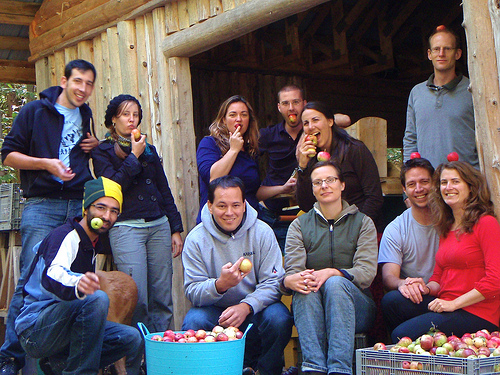The first day of rabble’s Eat Local! food and sustainability challenge found me on my back step with a hammer, clumsily smashing open black walnuts collected last fall from a tree in Ottawa’s Dominion arboretum and then forgotten in my freezer.
It’s a shame I didn’t have a nutcracker, and even more of a shame that I was working on this task alone, because I believe that the best part of this last decade’s upsurge of interest in local food is its potential break us out of individualist mode and bring us together with our neighbours. A turn towards local food can re-connect us not only to the seasons, soils and plants of our home region, but also to each other.
Sure, the buzz around local food can be (and is) used by corporate marketeers to carve out yet another niche market among trend-savvy shoppers. But “eat local” can go so much deeper than an individual consumer choice at the grocery store to buy, say, this Ontario-grown pear rather than that Argentinian one.
When local means our own city blocks, it can quickly lead to getting our hands dirty alongside our neighbours in the planting, tending and harvesting of plants. That kind of work (and fun) creates connections between people that often cut across the boundaries of age, gender, ethnicity and class.
I’ve seen this happen in my hometown of Ottawa, with the proliferation over the past decade of community gardens, urban farm projects, community-supported agriculture, non-profit food markets, fruit- and nut-tree picking parties, canning workshops and wild edibles foraging tours.
Much of the advocacy, training and capacity-building groundwork for this swell of activity has been laid by Just Food, a local food security organization with marvelous energy and vision.
Several years ago, I started talking to my neighbours about the idea of a community garden in Old Ottawa South after moving to the neighbourhood and seeing how much open park space it had. I was eventually joined by about a dozen fellow conspirators. We put in hundreds of hours of work planning, fundraising for, and finally building a garden in Brewer Park last spring.
The garden has quickly become a hub of activity, interaction and learning on a scale that surpasses anything I’d imagined when I first raised the idea. We’ve now been joined by more than 50 garden members and volunteers.
Most members garden in their individual plots; many also help tend the communal plots, children’s plots and donation plots, where we grow food to donate to local churches for their free meal programs. An ambitious handful of members have designed and will soon build a dome-shaped passive greenhouse to extend the garden season and serve as a demonstration of ecologically sound food-growing techniques.
Countless kids from nearby daycares, summer camps and schools have used the children’s garden plots to get their hands dirty and learn how food is grown. Lots of learning happens in the members’ plots too, through formal workshops and demonstration plantings or just impromptu tips shared while pulling weeds or watering the plots.
The last time I was at the garden, I had a wonderfully geeky conversation about squash varieties, water conservation and pollinators with a twelve year-old boy who was excited to be planning what he’d plant in the plot his family had just signed up for.
My garden’s not unique in bringing people together this way. Last summer, to give just one other example, the Ottawa Art Gallery sponsored what it called a community art garden on a busy downtown street corner. An artist designed the garden and started plants indoors with the help of kids living or at risk of living on the streets, through a partnership with the agency Operation Come Home.
People attended work bees and workshops in the garden throughout the summer, and passerby were invited to freely wander through the garden and pick from the plants. Much of the produce went to The Ottawa Mission’s nearby shelter and soup kitchen. The project culminated with a public feast in the fall.
The urban food movement isn’t just about gardening, of course. It’s also focused on harvesting the untapped bounty of fruits, nuts, wild greens and other edibles growing freely in our cities. And just as it takes a group effort to build a community garden, many hands are needed to harvest a bumper crop of crab apples or serviceberries.
Hidden Harvest Ottawa is a social enterprise tackling the challenge of bringing hands together to salvage fruits and nuts that would otherwise fall to the ground and rot. It works by connecting people who have food-bearing trees on their property to teams of volunteers eager to help pick the fruit or nuts. They pick a date, meet up and have a big ol’ picking party. Part of what they harvest, they keep. Equal parts go to a local food bank, to the tree owner and to Hidden Harvest Ottawa.
Maybe I just need to get out more, but that sounds to me like a damn fine way to spend a Saturday afternoon.
And the urban food movement looks to me like something with great potential to make our neighbourhoods a bit less like collections of atomized consumers, and a bit more like communities.
What better basis for community that the tending and harvesting of local plants to nourish our bodies and delight our palates?



